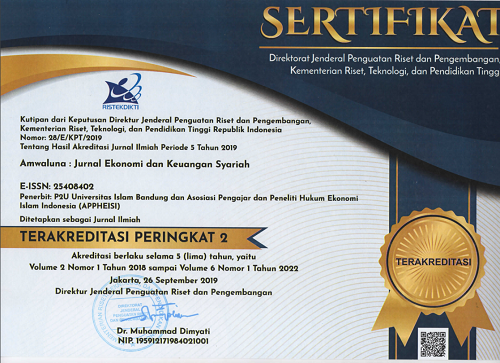KONSEP KEADILAN BAGI NASABAH DALAM PENERAPAN AKAD MURABAHAH BIL WAKALAH DI BANK SYARI'AH
Abstract
The principle of wakalah is applied in murabahah financing products, namely murabahah bil wakalah. The bank acts as a representative in buying goods and the bank submits money to customers to become a representative. For the customer's work, there is even injustice between the Islamic bank and the customer. As happened in the product of service in general, banks as parties that are given the mandate to get fees from customers. However, in the practice of murabahah financing, customers who become representatives do not receive fees from the bank as muwakkil. The formula for this research is (1) How is the application of the murabahah bil wakalah contract to Islamic banks? and (2) What is the justice for customers in the murabahah bil wakalah contract for Islamic banks? The method used is a qualitative research method. The type of research used in this study is library research, which is a form of methodology for collecting data and information with the help of books in the library, and other library materials. The results of this study are in practice the purchase of murabahah objects can be done by the customer as a representative of the bank with a wakalah contract. The customer acts for and on behalf of the Islamic bank to purchase the murabahah object. After the wakalah contract is completed, the murabahah object in principle has become the property of the Islamic bank so that the next contract can be carried out, namely the murabahah contract. Judging in the murabahah bil wakalah contract the value of justice is still not evenly distributed, so that from the relationship between the customer and the bank, the bank benefits more.
Full Text:
PDF (Bahasa Indonesia)References
Achsien, I. H, & Purnamasari, D. L. (2016). Islamic Crowd-funding as The Next Financial Innovation in Islamic Finance: Potential and Anticipated Regulation in Indonesia. European Journal of Islamic Finance, Nomor 5, 2016.
Bank Indonesia dan Lembaga Pengembangan Perbankan Indonesia (LPPI). (2015). Profil Bisnis Usaha Mikro, Kecil dan Menengah (UMKM).
Belleflamme, P, & Lambert, T. (2014). Crowdfunding: Some Empirical Findings and Microeconomic Underpinnings. Louvain School of Management Research Institute.
Ghazali, N.H., Yasuoka, T. Awareness and Perception Analysis of Small Medium Enterprise and Start-up Towards FinTech Instruments - Crowdfunding and Peer-to-Peer Lending in Malaysia. International Journal of Finance and Banking Research. Vol. 4, No. 1, 2018, pp. 13-24.
Hidajat, T., Primiana, I., Nidar, S., & Febrian, E. (2016). Crowdfunding: Financial Service for Unserved Crowds in Indonesia. International Conference of Integrated Microfinance Management, Padjajaran University, Bandung, pg. 109-115.
Kuti, M, & Madarasz, G. (2014). Crowdfunding. Public Finance Quarterly, 335-336.
Marzban, S., Asutay, M., & Boseli, A. (2014). Shariah-Compliant Crowd Funding: An Efficient Framework for Entrepreneurship Development in Islamic Countries. Harvard Islamic Finance Forum 2014.
Mitra, D. (2012). The Role of Crowdfunding in Entrepreneurial Finance. Delhi Business Review, Vol 13, No. 2.
Quandah, E. (2016). The Effect of Crowdfunding on Entrepreneurship Exploratory Study from the Perspective of Entrepreneurs in Business Incubators in Jordan. (Tesis Magister, Fakultas Bisnis, Middle East University)
Sulistiani, S.L. (2017). Distribusi dalam Ekonomi Islam untuk Pembangunan Negara Menurut Baqr Ash-Shadr dan M. Abdul Manan. Amwaluna, Vol. 1 No. 1 (Januari, 2017), Hal 133-149.
Srisusilawati, P., & Eprianti, N. (2017). Penerapan prinsip keadilan dalam akad mudharabah di lembaga keuangan syariah. Law and Justice, 2(1), 12-23.
DOI: https://doi.org/10.29313/amwaluna.v3i2.4297
Refbacks
- There are currently no refbacks.
Editorial Office:
Syariah Faculty, Universitas Islam Bandung
Jalan Tamansari No. 24-26 Kota Bandung

Amwaluna : Jurnal Ekonomi dan Keuangan Syariah is licensed under a Creative Commons Attribution-NonCommercial-ShareAlike 4.0 International License.







